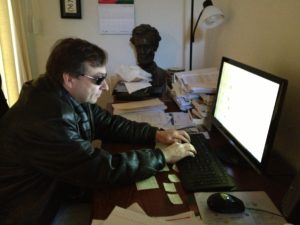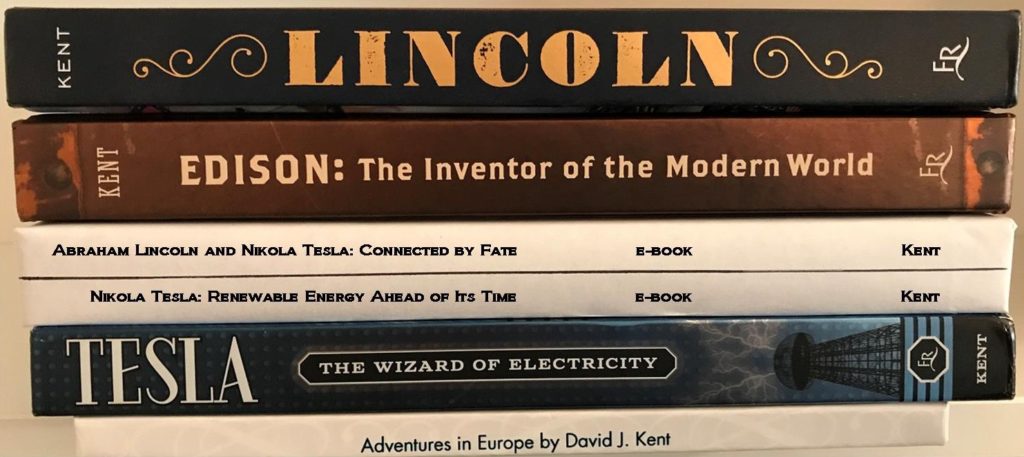 The writing life has kept me busy this past year. In fact, 2017 rivaled 2016 in productivity, especially given I took two long overseas trips (South Korea/China and Australia/New Zealand). [Did you know there are no monkeys in Australia?] In any case, these and past travels may end up in books some day. While traveling, I took advantage of long flights and sporadic internet access to get in some serious writing.
The writing life has kept me busy this past year. In fact, 2017 rivaled 2016 in productivity, especially given I took two long overseas trips (South Korea/China and Australia/New Zealand). [Did you know there are no monkeys in Australia?] In any case, these and past travels may end up in books some day. While traveling, I took advantage of long flights and sporadic internet access to get in some serious writing.
Last year I mentioned that, in addition to my Edison book hitting stores, I was working on a new book. Well, Lincoln: The Man Who Saved America came out in August and has been doing very well in Barnes and Noble stores nationwide. Reception from the public and other Lincoln scholars has been very positive and heartwarming, so I’ve been busy with book launch activities, including presentations at the DC Historical Society and the Lincoln Group of DC. [I’ve also just been voted onto the Board of Directors of the Abraham Lincoln Institute]
The writing continues. I have not one, but two, books in progress. One is an “accessible scholarly” book on Lincoln’s interest in technology; the other a travel memoir in the style of Bill Bryson, but with more science. And because that isn’t enough, in January I’ll be formally proposing a book in which members of the Lincoln Group of DC will contribute chapters. Stay tuned.

My previous books are also doing well. My Edison book is now apparently sold out at Barnes and Noble so I’m expecting a new printing in early 2018 (as well as one for Lincoln). I’ve already seen a Dutch translation (and now German) of Edison and expect others shortly. Even better news – my Tesla book is now into its 8th printing! It too has a Dutch translation, as well as German, Spanish, and now Czech. There may be others, so if you see a translation not listed please post a picture on my Facebook author page.
But there’s more. I wrote hundreds of blog posts here on Science Traveler (my official author page) as well as Hot White Snow (creative writing) and The Dake Page (science communication). I was also asked by the Chesapeake and Potomac Regional Chapter of SETAC to contribute an article on science communication for their fall newsletter. And I continue to write two book reviews per issue for the Lincoln Group of DC’s quarterly, The Lincolnian.
Like all good writers, I read a lot. This year I have read 116 books, surpassing last year’s total of 106 (which surpassed the previous year’s 96). I confess that I may actually cut back slightly in 2018 as I’m anticipating a heavy travel and writing year. We’ll see.
My mantra for 2018 is to Write!, Write!, Write!
Which reminds me, I’m off to write.
David J. Kent is an avid science traveler and the author of Lincoln: The Man Who Saved America, now available. His previous books include Tesla: The Wizard of Electricity and Edison: The Inventor of the Modern World (both Fall River Press). He has also written two e-books: Nikola Tesla: Renewable Energy Ahead of Its Time and Abraham Lincoln and Nikola Tesla: Connected by Fate.
Check out my Goodreads author page. While you’re at it, “Like” my Facebook author page for more updates!
Follow me by subscribing by email on the home page. Share with your friends using the buttons below.



 I write a lot. But I also read a lot, which all the writing books says is required to be a good writer (and I concur). My book counts have slowly been creeping up, from 84 in 2014 to
I write a lot. But I also read a lot, which all the writing books says is required to be a good writer (and I concur). My book counts have slowly been creeping up, from 84 in 2014 to  After writing hundreds of thousands of words it is safe to say that 2016 was a productive year. To recap the highlights:
After writing hundreds of thousands of words it is safe to say that 2016 was a productive year. To recap the highlights:

 For Earth Day –
For Earth Day –  Hot White Snow
Hot White Snow The Dake Page
The Dake Page Science Travele
Science Travele



 The Dake Page
The Dake Page
 Book Review – Lincoln in New Orleans by Richard Campanella
Book Review – Lincoln in New Orleans by Richard Campanella Book Review: The People’s Republic of
Book Review: The People’s Republic of  The Puppet Suit
The Puppet Suit






